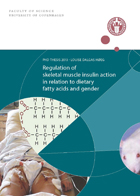PhD defence: Regulation of skeletal muscle insulin action in relation to dietary fatty acids and gender
Louise Dalgas Høeg
PhD thesis
Insulin resistance is an impaired biological response to circulating insulin and plays a major role in the pathogenesis of type 2 diabetes. The development of insulin resistance is influenced by gender and unhealthy lifestyle factors such as physical inactivity and dietary fatty acids.
In the present thesis the aims were
- to investigate whether insulin sensitivity was different between women and men and whether a lipid load induced insulin resistance to a similar extent in women and men,
- to determine whether lipid-induced insulin resistance was due to energy surplus or dietary fatty acid quality and/or chain-length,
- to investigate molecular mechanisms underlying lipid-induced insulin resistance.
Results from studies provided in this thesis showed that insulin stimulated glucose uptake in skeletal muscle was higher in women than in matched men. When increasing fatty acid availability by intralipid infusion, women were less prone to develop acute lipid-induced insulin resistance on a whole-body level compared with men. After consuming a hypercaloric fat-rich diet (80 E%) enriched in either unsaturated fatty acids or long-chain saturated fatty acids for three days, insulin stimulated whole-body and skeletal muscle glucose uptake were reduced to a similar extent in men compared with a isocaloric control diet. However, no changes were observed after a diet enriched in medium-chain saturated fatty acids and carbohydrates. These findings show that insulin sensitivity was influenced by quality and chain-length of fatty acids.
The lipid-induced reduction in skeletal muscle insulin sensitivity was observed without changes in the proximal insulin signaling cascade. The lipid-induced decrease in insulin sensitivity in skeletal muscle could rather be ascribed to attenuated GLUT4 translocation to the plasma surface membrane after the unsaturated (23%) and long-chain saturated fatty acid diet (26%) compared with the control diet (52%)(investigated in rats). Furthermore, the present data suggest that mechanisms regulating GLUT4 translocation and insulin stimulated glucose uptake in skeletal muscle were dietary fatty acid specific depended.
2013, 147 pages,
ISBN 978 87 7611 573 7
Time
22 May 2013 at 14:00
Venue
Auditorium 1, August Krogh building, Universitetsparken 13, Copenhagen, Denmark.
Opponents
Professor Ylva Hellsten (chair), Department of Nutrition, Exercise and Sports, University of Copenhagen, Denmark.
Associated Professor Niels Jessen, Department of Molecular Medicine, Aarhus University, Denmark.
Professor Patrick Schrauwen, Maastricht University Medical Centre, Maastricht, The Netherlands.
Supervisor
Professor Bente Kiens, Department of Nutrition, Exercise and Sports, University of Copenhagen, Denmark.

